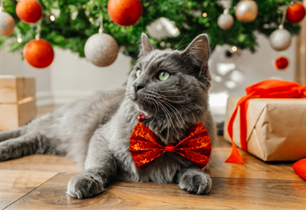Tips for a safe, hazard-free holiday with your cat
The holiday season means food and fun combined with lots of hustle and bustle. We’ve compiled a list of pet-proofing tips including a few simple precautions that will keep your cat safe amid all the jolly chaos.
Decorations
You can’t do holidays without decorations, but luckily, making pet-proofed choices won’t reduce your cheer.
- If you put a tree up, shatter-proof ornaments are the logical choice.
- Hang smaller ornaments toward the top of the tree to avoid a choking hazard.
- Keep salt dough ornaments out of reach. They might seem like a tasty snack to exploring cats but can cause electrolyte problems if ingested.
- Avoid using tinsel. Tinsel is often irresistible to curious cats, and if ingested, it can become lodged in the gut and cause serious problems, so it’s best avoided altogether.
Foods
With the holiday season comes a delicious variety of baked goods, chocolate confections and other rich, fattening foods. Foods that can present problems for cats include:
- Chocolate and cocoa contain theobromine, a chemical similar to caffeine that’s highly toxic to cats. Ingestion in small amounts can cause vomiting and diarrhea, but large amounts can cause seizures and heart arrhythmias.
- Leftover fatty meat scraps can produce severe inflammation of the pancreas (pancreatitis), leading to abdominal pain, vomiting and bloody diarrhea.
- Unbaked bread dough leads to trouble when the yeast heats up inside the stomach and turns into ethanol and carbon dioxide.
- Onions and garlic. These flavor boosters damage the red blood cells of pets, especially cats. This is true for the raw vegetables as well as their powdered forms.
Plants
While plants can liven up any space, keep these safety tips in mind:
- Avoid lilies. Lilies are very toxic to cats, and even one bite can cause irreversible kidney failure.
- Be careful with poinsettias. Poinsettias get a bad rap, but the stomach upset they cause is much milder than the symptoms associated with holly, mistletoe and amaryllis.
- Although a Christmas tree is not toxic, its needles don’t digest well and its water may contain bacteria, mold or fertilizer that you definitely don’t want your cat to ingest.
Questions about cat-safe holiday food and activities? Live Chat anytime for free* this festive season with a licensed veterinary professional through the myVCA™️ app. >>
*Live Chat with a licensed veterinary professional is free for VCA clients through the myVCA mobile app, available at Apple's App Store and Google Play.
